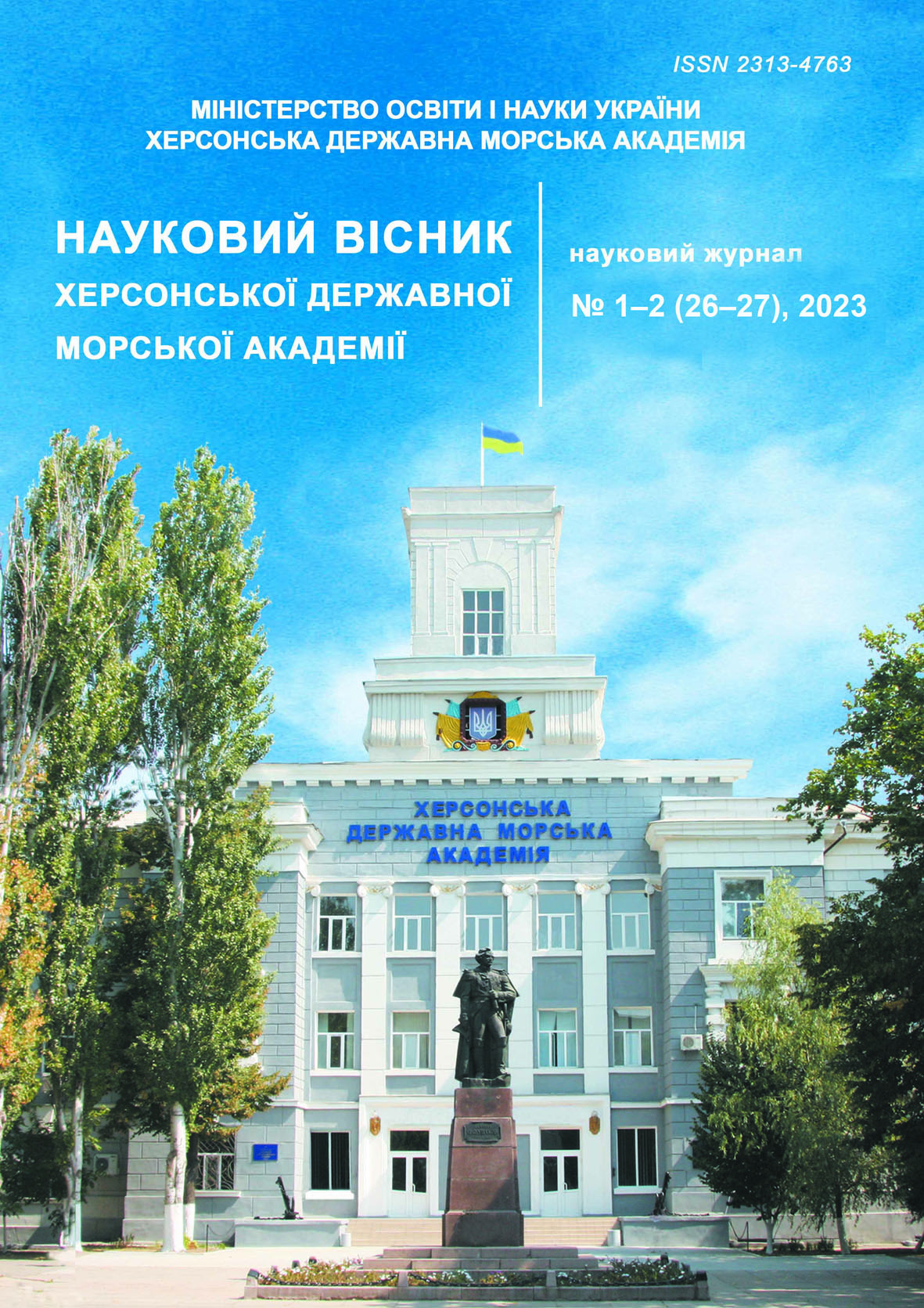МАТЕМАТИЧНЕ МОДЕЛЮВАННЯ ТА АНАЛІЗ НАДІЙНОСТІ НАВІГАЦІЙНОГО КОМПЛЕКСУ
https://doi.org/10.33815/2313-4763.2023.1-2.26-27.082-095
Анотація
У статті досліджено навігаційний комплекс як систему масового обслуговування та визначено співвідношення між складністю умов плавання та можливостями системи. Проведено математичне моделювання та аналіз надійності навігаційного комплексу судна з точки зору теорії масового обслуговування. Представлена робота є однією з піонерських по застосуванню теорії масового обслуговування для аналізу проблем безпечного судноводіння, що забезпечує її актуальність і наукову новизну. Розроблена математична модель доведена до чисельних експериментів і проведена візуалізація отриманих результатів та їх математична обробка шляхом побудови квадратичних апроксимаційних рівнянь, що зв’язують вірогідність робочого стану систем з відповідними інтенсивностями потоків відмов і обслуговування. Математичне моделювання проведено для різних умов складності судноводіння (від відкритого моря, до каботажного плавання і припортових маневрувань). Це забезпечує і високу практичну значимість наведених результатів моделювання при розробці відповідних регламентів судноводіння і при виконанні оцінок потенційних переваг електронної навігації.
Посилання
2. Baldauf, M., Hong, S.-B. (2016). Improving and assessing the impact of e-navigation applications. International Journal of e-Navigation and Maritime Economy, 4, 1–12. doi: 10.1016/j.enavi.2016.06.001.
3. Dmitriev, S. P., Osipov, A. V., Koshaev, D. A. (2006). Detection of information failures in marine navigation systems and their reconditioning. 6th IFAC Symposium on Fault Detection, Supervision and Safety of Technical Processes, 39(13). doi: 10.3182/20060829-4-CN-2909.00248.
4. Felski, A., & Zwolak, K. (2020). The Ocean-Going Autonomous Ship – Challenges and Threats. Journal of Marine Science and Engineering, 8(1), 41.
5. Wróbel, K., Montewka, J., & Kujala, P. (2018a). System-theoretic approach to safety ofremotely-controlled merchant vessel. Ocean Engineering, 152, 334–345.
6. Wróbel, K., Krata, P., & Montewka, J. (2019). Preliminary results of a system-theoretic assessment of maritime autonomous surface ships’ safety. TransNav, International Journal on Marine Navigation and Safety of Sea Transportation, 13(4).
7. T.-W. Lee, P., Bolbot, V., Theotokatos, G., Boulougouris E. & Vassalos, D. (2021). Fault tree analysis of the autonomous navigation for maritime autonomous surface ships. Proceedings of the 1st International Conference on the Stability and Safety of Ships and Ocean Vehicles, 1, 1–10.
8. Aksu, S. (2019). Assessing compartment-wide damage consequences in ships and offshore vessels using Fault Trees with System Location Attribution. Ocean Engineering, 192, 106510.
9. Banda, O. A. V., Kannos, S., Goerlandt, F., van Gelder, P. H., Bergström, M., & Kujala, P. (2019). A systemic hazard analysis and management process for the concept design phase of an autonomous vessel. Reliability Engineering & System Safety, 191, 106584.
10. Ivanov, A. A. & Ivanovsky, N. U. (2013). Study of the stability of the navigation system of a sea vessel. Information and control systems, 1/9(61), 65–68.
11. Abramov, G. S., Makarchuk, D. V., Nosov, P. S. & Zinchenko, S. M. (2021). The ship officer as a failure-prone single-channel queueing system. Materials of the 13th international scientific and practical conference “Modern information and innovation technologies in transport (MINTT-2021)”, 13, 157–162.
12. Aubakirov, S. K. & Selivyorstov, P. Y. (2016). System of mass service. Post capacity. Bulletin of Science and Education, 6(18), 44–47.
13. Abramov, G. S., Makarchuk, D. V. & Plotnikov, V. I. (2023). Analysis of the stability of marine navigation complex systems from the point of view of the QS. Materials of the 15th international scientific and practical conference “Modern information and innovation technologies in transport (MINTT-2023)”, 15, 244–249.
14. Rausand, M., Hoyland, A. (2021). System Reliability Theory: Models,Statistical Methods, and Application. Wiley.
15. Melani, A. H. A., Murad, C. A., Caminada Netto, A., Souza, G. F. M.d., Nabeta, S. I. (2018).Criticality-based maintenance of a coal-fired power plant. Energy, 147:767–781. doi: 10.1016/j.energy.2018.01.048.
16. Daya, A. A., Lazakis, I. (2023). Developing an advanced reliability analysis framework for marine systems operations and maintenance. Ocean Engineering, 272, 1–17. doi: 10.1016/j.oceaneng.2023.113766.
17. Jeong, B., Lee, B. S., Zhou, P., Ha, S.-m. (2018). Quantitative risk assessment of medium-sized floating regasification units using system hierarchical modelling. Ocean Engineering, 151:390–408.
18. Tan, Z., Li, J., Wu, Z., Zheng, J., He, W. (2011). An evaluation of maintenance strategy using risk based inspection. Safety Science, 49 (6), 852–860.
19. Kiran, D. R. (2017). Failure Modes and Effects Analysis. Total Quality Management. Key Concepts and Case Studies, Butterworth-Heinemann, 373–389. doi: 10.1016/B978-0-12-811035-5.00026-X.
20. Abramov, G. S., Plotnikov, V. I. & Zinoviev, V. I. (2023). Analysis of the reliability of the navigation complex and its influence on the functioning of the maritime logistics system. Materials of the 1st International Scientific and Practical Conference “Transport, port, logistics, security: modern-day challenges and development prospects”, 1, 17–29.
21. Columbia Shipmanagement (2018). Bridge Operations Manual BOPR-01.2.
22. Ministry of Oceans and Fisheries (2015). The study on systems to prevent safety accidents in maritime sectors, Seoul: Author.






